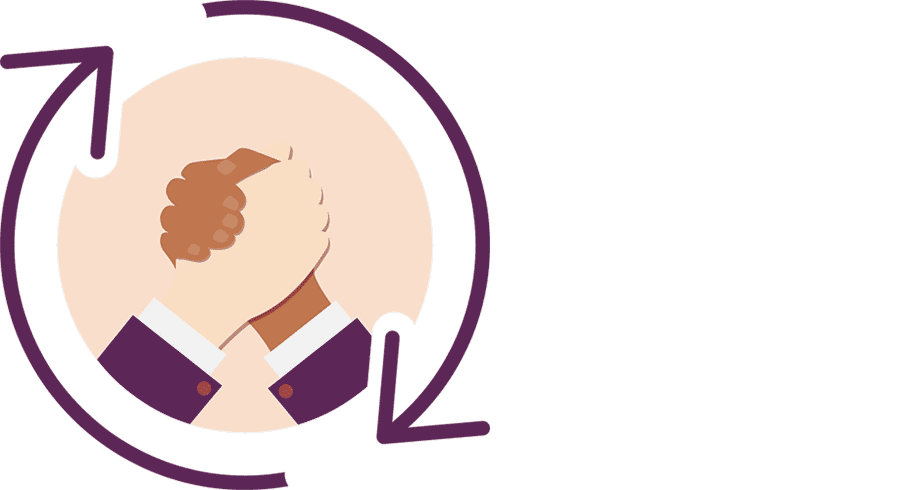
Services
Executive Coaching
Whether we call it ‘Executive Coaching’ or any other kind of Coaching, the premise is to “change the things that don’t add value”. It’s about the Coach partnering and co-creating with you in a thought-provoking and creative manner that inspires you to maximize your potential and becoming the best version of yourself.
Coaching approaches you holistically, as a whole person. The idea that we ‘leave life at the office door’ and vice versa isn’t true. What happens at home impacts work and what happens at work impacts the rest of your life.
What do you want more of? What do you want less of? How do you want to grow?
“Working with Hanna Bankier was very productive, and gave me an opportunity to self-analyze and then self-correct... I recommend her services to anybody in management as a tool to help them better understand their goals and drives, and how best to achieve them.”
— Systems Manager, Bay Area
Culture Assessment and Change
“Culture eats strategy for lunch” is a common saying. Why? Because regardless of what your Mission and Vision statements say, culture overpowers it all.
What’s company culture? It’s formed by vision, norms, beliefs, environment, symbols, and traditions, in other words “how we get things done around here”: How is information shared? Who is in the room? What’s the decision making process? How are resources allocated? How do we set our people up for success?
Changing culture successfully and sustainably requires buy in from the top. We want to create a culture with intent, as opposed to letting it happen to us.
“Hanna’s work was incredibly beneficial, effective, valuable and she brought clarity to a challenging situation. She always listened, really helped us getting to the core of the matter and provided great feedback.”
— Brinda Sundar, HR Manager, Premier Organics
Diversity, Equity and Inclusion
Valuing diversity means that we recognize and respect everyone's unique qualities and attributes.
Inclusion means creating environments where all individuals feel respected, accepted and valued. Equity means leveling the playing field so we all get a fair shake, regardless what our starting point is, through procedures, processes and distribution of resources. We examine biases and privilege including the 7 groups where you can be an ‘up’ or a ‘down’: Gender, Race/Ethnicity, Religion, Able bodyism, Age, Sexual Orientation, Socio-economic Status. We might add Immigration Status too.
We look at the current state of diversity, recruitment and selection, retention and diverse teams, leadership and boards, and programs and stakeholders in your organization and address any gaps.
Study after study show that more diverse and inclusive teams has a direct positive impact on the bottom line – we make better decisions by including more perspectives and experiences. And, as human beings, creating equity in process and opportunities is simply the right thing to do.
Team Alignment
An aligned team is a team who aspires to achieve the same vision, understands the goals, and is made up of individuals who understand how to contribute their strengths to the team.
It’s the way we work towards a common, stated goal and vision: how and when do we ask questions? In other words, team alignment creates numerous benefits including improved productivity and improved performance.
“Working with Hanna Bankier has been an extremely helpful experience on my life. The way she coached me on managing my team has been invaluable to my success as a manager. I especially liked how she listened to the problems at hand and offered a bunch of different solutions without pointing blame. I recommend this service to any company that is having cohesiveness issues, I am sure she can help all the employees see things from a different perspective.”
— Adrian Bishop, Warehouse Manager, Bay Area
Facilitation
The facilitator guides and intervenes, by making suggestions and offering insights, to help the group improve how it identifies and solves problems and makes decisions, to increase the group’s effectiveness. Facilitators remain neutral and are not the decision makers, but rather encourage participation from all members of the group and help illuminate learning outcomes.
Showing up with realness, acceptance and empathy, the Facilitator is helping people explore, learn and change. The Facilitator is the expert on the processes and structures, supporting the group in achieving its objectives and to do this through enabling the group to take control and responsibility for the way they proceed.
A client wanted to learn from a major project and we decided to do a “Post Mortem” process together. We were looking at the amount of time and resources given to the project as well as the objectives of the project ‘what does success look like?’. How closely were the objectives met? We broke down all the phases of the project, analyzed decisions made before and along the way, and celebrated the learnings, applying them to the next project.
Conflict Coaching and Resolution
Conflict resolution is the process that two or more parties use to find a peaceful solution to their dispute.
It occurs whenever people disagree over their values, motivations, perceptions, ideas, or desires. We set the ground rules. Using key communication skills we look at different perspectives, assumptions, needs and feelings before we generate solutions and negotiate a sustainable settlement agreement.






